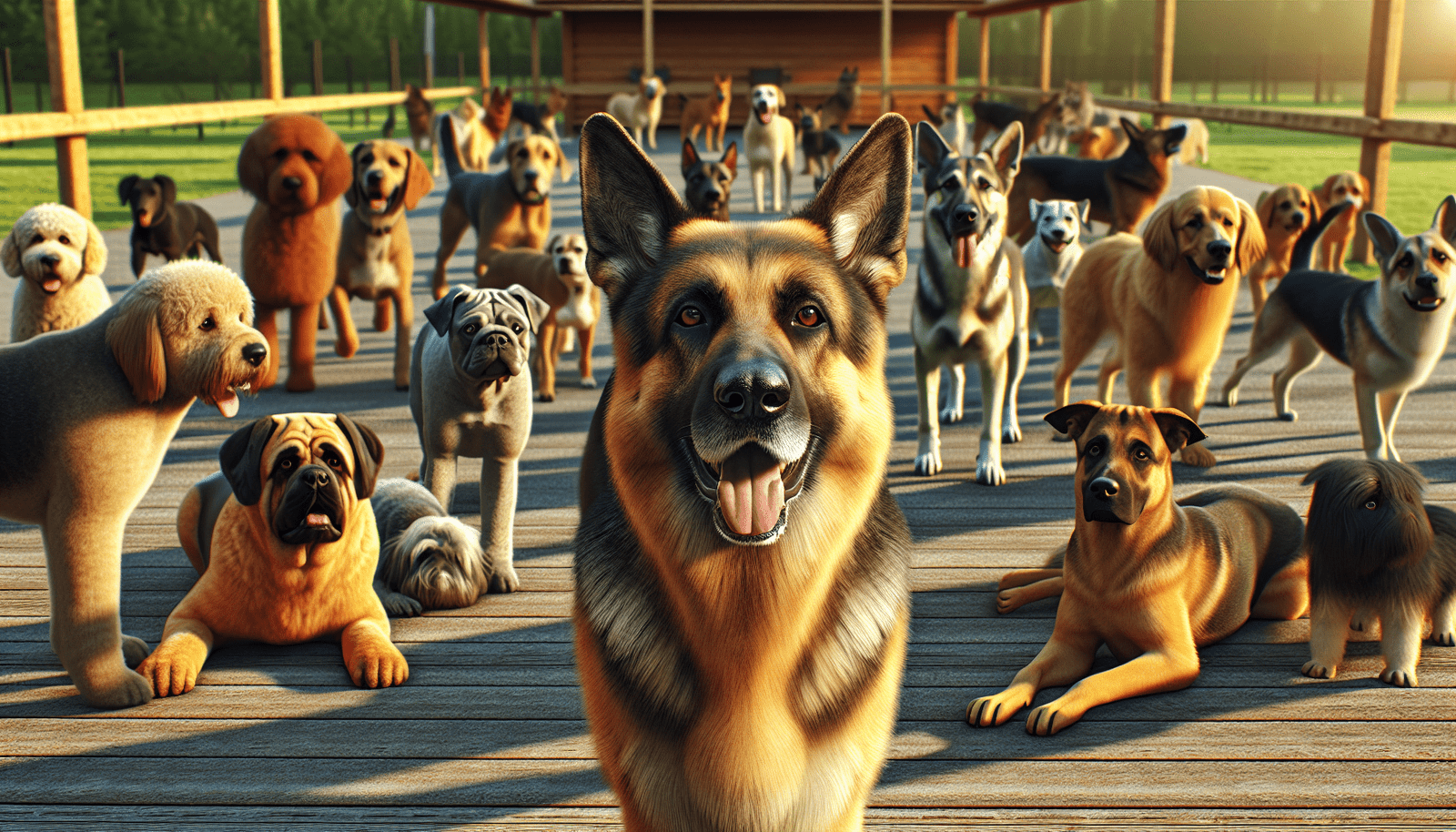German Shepherds, known for their intelligence, loyalty, and versatility, are often sought after as family pets. But when it comes to their interactions with other dogs, do German Shepherds hold up as well? This article explores the social nature of German Shepherds, shedding light on their tendencies and providing insights into whether these majestic canines make good companions for their furry counterparts. So, if you’re curious about whether your German Shepherd will be a social butterfly at the dog park or prefer their own company, read on to discover the truth behind this popular breed’s interactions with other dogs.
German Shepherds’ Temperament
German Shepherds are known for their loyal and protective nature. They are highly devoted to their families and will go to great lengths to protect them. This breed is often used for tasks such as search and rescue, police work, and guarding due to their strong protective instincts. German Shepherds are also intelligent and trainable, making them excellent companions.
High Energy Levels
German Shepherds are a high-energy breed, which means they require plenty of physical exercise and mental stimulation to stay happy and healthy. They have a lot of energy to burn, and if not properly exercised, they may become restless and potentially engage in destructive behaviors. Providing them with regular exercise such as long walks, runs, or play sessions will help keep their energy levels in check and prevent boredom.

Strong Prey Drive
Another characteristic of German Shepherds is their strong prey drive. This means that they have a natural instinct to chase and hunt prey. While this trait can make them excellent working dogs, it can also pose challenges when interacting with other dogs. It’s important for German Shepherds to be properly trained and socialized to ensure they can control their prey drive in a safe and appropriate manner.
Factors Affecting German Shepherds’ Interactions with Other Dogs
Several factors influence how German Shepherds interact with other dogs. Understanding these factors can help dog owners create positive experiences for their German Shepherds when introducing them to new canine friends.
Early Socialization
Early socialization is crucial for German Shepherds to develop positive relationships with other dogs. Exposing them to different environments, dogs of various breeds and sizes, and different people from a young age can help them become well-adjusted and friendly adults. Socialization should be a consistent and ongoing process throughout their lives.
Training and Obedience
Proper training and obedience are essential for German Shepherds to interact well with other dogs. Basic commands such as “sit,” “stay,” and “come” are important tools to have in their repertoire. Training not only teaches them obedience but also helps build their confidence and ensures they can respond appropriately to various situations.
Individual Personality
Like humans, each German Shepherd has a unique personality. While the breed may have certain tendencies, such as being protective or territorial, individual variations exist. Some German Shepherds may be more outgoing and sociable with other dogs, while others may be more reserved or wary. Understanding your dog’s personality can help tailor their interactions with other dogs accordingly.
Gender and Neutering
Gender can play a role in how German Shepherds interact with other dogs. Same-sex aggression can occur between intact males or females, as they may compete for dominance. Neutering or spaying your German Shepherd can help reduce the likelihood of this aggression, making their interactions with other dogs more harmonious.
Dog’s Breed and Size
The breed and size of the other dog can also influence a German Shepherd’s interactions. Some German Shepherds may be more comfortable around dogs of similar size or certain breeds. It’s important to consider the individual preferences and reactions of your German Shepherd when introducing them to dogs of different breeds or sizes.

Proper Introduction Process
Introducing German Shepherds to other dogs should be done using a controlled and gradual approach. Rushing the process can lead to negative experiences or potential conflicts. The following steps can help ensure a smooth introduction:
Neutral Territory
Choosing a neutral territory for the initial introduction is key. This can be a park or any other neutral space where neither dog feels a strong sense of ownership. Avoid introducing them in one dog’s territory, as it can trigger territorial behavior.
Controlled and Gradual Introduction
Start the introduction by allowing the dogs to observe each other from a safe distance. Use a leash for each dog to maintain control and ensure their safety. Gradually decrease the distance between the dogs while observing their body language and reactions. If any signs of stress or aggression arise, take a step back and give them more space.
Supervision and Intervention
Always monitor the interaction between the dogs closely, especially during the initial stages. Be ready to intervene if necessary to prevent any aggressive or uncomfortable behavior. It’s important to create a positive and controlled environment for both dogs.
German Shepherds’ Breed Tendencies
German Shepherds have certain natural tendencies that can influence their interactions with other dogs. These tendencies should be taken into account when introducing them or managing their interactions.
Pack Mentality
German Shepherds have a strong pack mentality, which means they tend to see their family as their pack. When introduced to other dogs, they may view them as either members of their pack or potential threats. Proper socialization and training can help them navigate these instincts and establish harmonious relationships with other dogs.
Herding Instincts
As a breed originally developed for herding, German Shepherds have a strong instinct to control the movement of other animals. This herding instinct can manifest in their interactions with other dogs, leading to behaviors such as nipping or barking. Supervision and training can help channel these instincts in a positive manner.
Territorial Behavior
German Shepherds can be territorial, especially when it comes to their home or family. They may display protective behavior when other dogs enter their territory. It’s important for owners to set boundaries and establish clear rules to prevent conflicts during such situations.
Signs of Aggression or Discomfort
It’s crucial for dog owners to be able to recognize signs of aggression or discomfort in German Shepherds when interacting with other dogs. By identifying these signals early on, owners can take appropriate actions and prevent potential conflicts.
Stiff Body Language
When a German Shepherd feels threatened or uncomfortable, their body language may become stiff and rigid. They may hold their tail high, have a rigid stance, and show signs of tension. It’s important to address the situation and provide support to ensure their well-being.
Hair Standing on End
An aggressive or fearful German Shepherd may have their hair standing on end along their back and neck. This raised hair, often referred to as “hackles,” is a clear sign of discomfort or arousal.
Growling or Snarling
Growling or snarling is another indication that a German Shepherd is feeling threatened or uncomfortable. It’s important to intervene and remove the source of their discomfort to prevent a potential escalation of aggression.
Tips to Promote Positive Interspecies Relationships
To foster positive relationships between your German Shepherd and other dogs, consider implementing the following strategies:
Proper Socialization from Early Age
Start socializing your German Shepherd from an early age by exposing them to various environments, people, and dogs. Gradually increase the level of exposure to different stimuli to ensure they become well-rounded and confident when interacting with other dogs.
Positive Reinforcement Training
Use positive reinforcement techniques to train your German Shepherd. Rewarding good behavior with treats, praise, or play helps create a positive association with other dogs. This, in turn, encourages them to have positive interactions and reduces the likelihood of aggression or discomfort.
Ensuring Sufficient Exercise and Mental Stimulation
To prevent restlessness or frustration, provide your German Shepherd with ample physical exercise and mental stimulation. Regular walks, engaging toys, and interactive games can help drain excess energy and keep them mentally engaged. A tired and content German Shepherd is more likely to have positive interactions with other dogs.
Giving Each Dog Individual Attention
While it’s important to promote positive relationships between your German Shepherd and other dogs, it’s equally crucial to give each dog individual attention. Spending quality one-on-one time with each dog helps foster a strong bond and ensures they feel valued and loved.
Regular Veterinary Check-ups
Regular visits to the veterinarian are essential for the overall well-being of your German Shepherd. Regular check-ups can help detect any underlying health issues that may contribute to behavior problems or discomfort when interacting with other dogs. It’s important to ensure they are in good physical health to have successful interactions.
Common Issues and Challenges
While German Shepherds can have positive relationships with other dogs, there are some common issues and challenges that owners may face. It’s important to address these challenges promptly to prevent them from escalating.
Same-Sex Aggression
Same-sex aggression can occur between intact males or females. It’s important to monitor the interactions between same-sex dogs carefully, especially if they are not neutered or spayed. Professional guidance may be necessary to manage same-sex aggression effectively.
Conflict Over Resources
Resource guarding is a common challenge among dogs, including German Shepherds. It involves protecting valuable resources such as food, toys, or attention from other dogs. Proper training and preventing situations that trigger resource guarding can help minimize conflicts.
Dominance Issues
German Shepherds are known for their strong personalities, and dominance can be a potential issue when interacting with other dogs. It’s important to establish clear rules and boundaries, provide consistent training, and seek guidance from a professional if dominance issues arise.
Lack of Proper Socialization
A lack of early and consistent socialization can lead to fear, aggression, or discomfort when interacting with other dogs. It’s crucial to prioritize socialization and provide experiences that help your German Shepherd build positive associations with other dogs.
Professional Training and Consultation
When facing challenging behavioral issues or struggling to foster positive relationships between your German Shepherd and other dogs, seeking professional training or behaviorist consultation can be highly beneficial.
Seeking a Certified Dog Trainer
Certified dog trainers have the knowledge and experience to analyze and address behavioral issues. They can provide tailored training programs and guidance to help improve your German Shepherd’s interactions with other dogs.
Dog Behaviorist Consultation
In some cases, consulting with a dog behaviorist may be necessary. Dog behaviorists specialize in understanding and addressing complex behavioral issues. They can assess the root causes of your German Shepherd’s behavior and provide an individualized behavior modification plan.
Positive Experiences with Other Dogs
While there may be challenges, German Shepherds can have positive experiences and relationships with other dogs. Implementing appropriate strategies and providing a supportive environment can help foster these positive interactions.
Well-Socialized German Shepherds
German Shepherds who have been properly socialized from an early age are more likely to have positive experiences with other dogs. By introducing them to various breeds and sizes of dogs, they can learn appropriate socialization skills and build confidence.
Supportive Doggy Daycare or Playgroups
Doggy daycare or playgroups can be beneficial for German Shepherds as they provide opportunities for supervised socialization. Participating in such environments allows them to interact with other dogs in a controlled and safe setting.
Successful Multi-Dog Households
German Shepherds can thrive in multi-dog households if the proper introductions and management are in place. Ensuring each dog has their own space, providing individual attention, and managing potential conflicts can create a harmonious environment for all the dogs.
Conclusion
The interactions between German Shepherds and other dogs can be influenced by various factors, including temperament, socialization, and training. By understanding their natural tendencies and implementing appropriate strategies, owners can foster positive relationships between their German Shepherds and other dogs. The importance of early socialization, effective training, and individualized approaches cannot be overstated. With the right guidance and commitment, German Shepherds can have fulfilling and harmonious relationships with other dogs.

